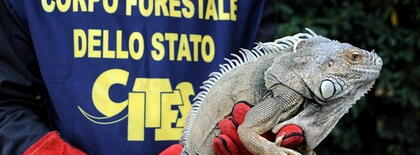What is wildlife and forest crime?
ICCWC considers ‘wildlife’ to include all wild fauna and flora, including animals, birds and fish, as well as timber and non-timber forest products.
‘Wildlife crime’ refers to the illegal taking, trading (supplying, selling or trafficking), importing, exporting, processing, possessing, obtaining and consumption of wild fauna and flora, including timber and other forest products, in contravention of national or international law.

Why must we combat it?
Wildlife crime is a serious transnational and organized threat. It not only impacts wildlife and their habitats and ecosystems but has broader implications for national and global security, development, public health, peoples livelihoods and the well-being of future generations. It is exacerbated by and can lead to instability, poor governance and corruption which depletes resources, deprives communities of their natural resources and weakens state institutions.
Industrial scale wildlife crime commonly involves transnational organized crime networks, which operate in the same way as those that traffic drugs, arms and persons. Crime convergence is also known to occur in many cases. These organized crime networks are highly adaptable and capable of devising their activities to exploit criminal justice systems, to quickly identify lucrative illicit markets, target species for which there are high demand, focus on key source locations, and to rapidly change their modus operandi to avoid suspicion and detection.
This makes it particularly challenging for law enforcement, wildlife authorities and criminal justice actors to affect change. A targeted, well-resourced and coordinated response across the entire criminal justice system is therefore required to address wildlife crime.

ICCWC's response
ICCWC works with officials from across the criminal justice system in countries around the world, to strengthen these systems and provide authorities with coordinated support to combat wildlife crime.
ICCWC acknowledges the need to address the socio-economic drivers behind wildlife crime and some ICCWC partners have aligned programs that address these larger socio-economic issues driving biodiversity loss. However the primary focus of ICCWC remains to provide a global response to ensure that effective law enforcement and criminal justice systems are in place to prevent illegal activities that result in the over-exploitation of natural resources and to protect nature while socio-economic change takes place.
The number of countries that request and benefit from ICCWC support continues to grow. The benefits of the Consortium’s holistic and coordinated approach and the complimentary mandates of its partners are evident. There is broad recognition of the central role of ICCWC in supporting and building long-term capacity among authorities responsible for addressing wildlife crime. The Consortium is providing authorities with the tools, services and technical support needed to mobilize the same measures against wildlife crime as those used against other serious domestic and transnational organized crimes, and building capacity to ensure that criminals involved in wildlife crime are investigated, prosecuted and convicted.

Related content
4th Global Meeting of Wildlife Enforcement Networks
4th Global Meeting of Wildlife Enforcement Networks The Secretariat of the Convention on International Trade in Endangered Species of Wild Fauna and Flora (CITES), in cooperation with its partners from the International Consortium on Combating Wildlife Crime (ICCWC) and with generous funding support from the United States of America convened...
Wildlife Enforcement Networks (WENs)
What are Wildlife Enforcement Networks? Regional and inter-regional cooperation is essential to combating wildlife trafficking effectively. A number of networks with different purposes and objectives focused on combating wildlife crime, and with varying degrees of formality and organization, have been developed across the world. In most cases these networks are...
Our Approach
ICCWC works with officials from across the criminal justice system in countries around the world, to strengthen these systems and provide authorities with coordinated support to combat wildlife and forest crime. ICCWC Vision 2030 and Strategic Action Plan 2023 - 2016 The ICCWC Vision 2030 was launche d at the...


